This post may contain affiliate links. Please read our disclosure policy.
Sfouf cake is a very simple, oil-based Lebanese yellow cake that is moist and comforting! It gets its bright color naturally with turmeric and it’s egg-free. This is an updated recipe that yields terrific results!
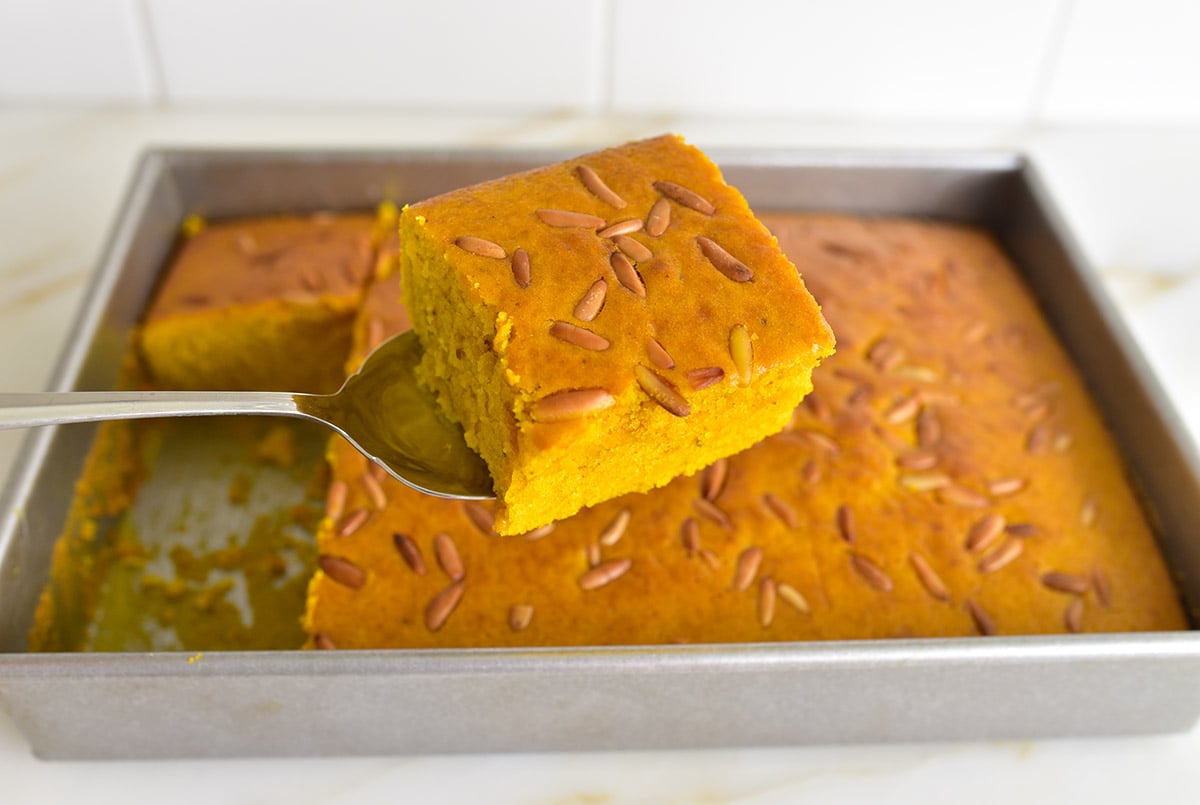
Sfouf cake, also known as Lebanese semolina cake, is a beloved treat in the Middle East, for many their favorite Lebanese cake. All of the most typical, classic of Lebanese cakes seem to include semolina flour. There is the plain sfouf semolina cake, and namoura semolina cake that is drenched in fragrant syrup, and a molasses semolina cake (Lebanese carob molasses), also drenched in syrup.
Developing recipes for my cookbook, Lebanese Baking, I read every sfouf recipe I could get my hands on (which is a lot!), and auditioned more than a slew of them with my own adjustments. The variations seem to primarily be in how thick the cake and how moist the end result. Ultimately this cake is meant to be a snack cake plain and simple, like the daily bread of a white blouse and jeans.
Some call sfouf “almond cake” but that would only refer to using almonds as a garnish rather than pine nuts. The word “sfouf” is the Arabic word for “rows,” as in rows of pine nuts across the top of the cake. Many sfouf recipes show the pine nuts scattered more than perfectly arranged, so either way is fair game. Because this is such a basic, simple cake, I like to go for the scattered look and have updated my recipe for a more moist, tender, perfect cake. This one is thicker than my former version of sfouf, and because of that I find it much better cut in squares than in diamond shapes. The pan (bottom only! read on to find out why!) is always coated with tahini rather than oil or butter.
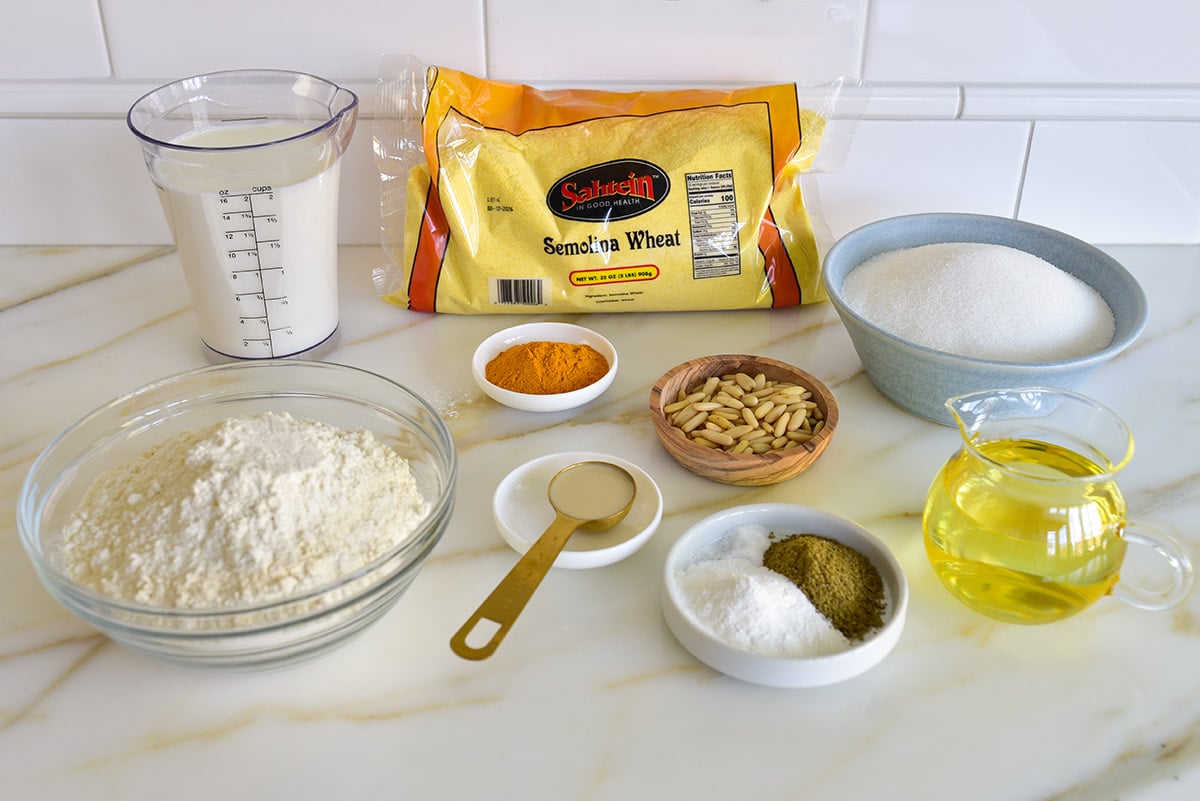
Ingredient Notes
All you need here is a simple combination of pantry ingredients: The main ingredients include fine semolina flour, purpose flour, sugar, baking powder, and turmeric powder, which gives the cake its distinctive golden color.
- Fine semolina flour and all-purpose flour. Take care that you’re getting this fine flour, which is different from ground semolina (and don’t mistake it for similarly colored corn flour!).
- Baking powder is essential because this eggless cake does not use any other leavening agent.
- Turmeric powder gives the cake its distinctive golden color, making this very much a turmeric cake. Plus, turmeric spice is loaded with nutrients!
- Use a neutral oil, as this is an oil-based cake and is moist partly because that. I like expeller-pressed canola oil but you can use vegetable or seed oils of any kind. Avoid olive oil for this one!
- Whole milk. This ingredient give the cake richness and tenderness. You can try plant-based milk such as almond milk but I haven’t run that test to ensure its an even substitution.
- Anise seeds, ground to anise powder (or purchase it already ground) is sooo so aromatic and wonderful in the cake. If you don’t use the anise, the cake will not have as much flavor.
- Tahini paste is not an ingredient in the cake but it does coat the bottom of the pan. It’s a minimal but nutty flavor that is traditional for this cake. Read more about tahini in my post What is Tahini?
- Pine nuts are used for topping the cake, not in the cake. Get the biggest, nicest pine nuts you can find!
Tips for Making Sfouf
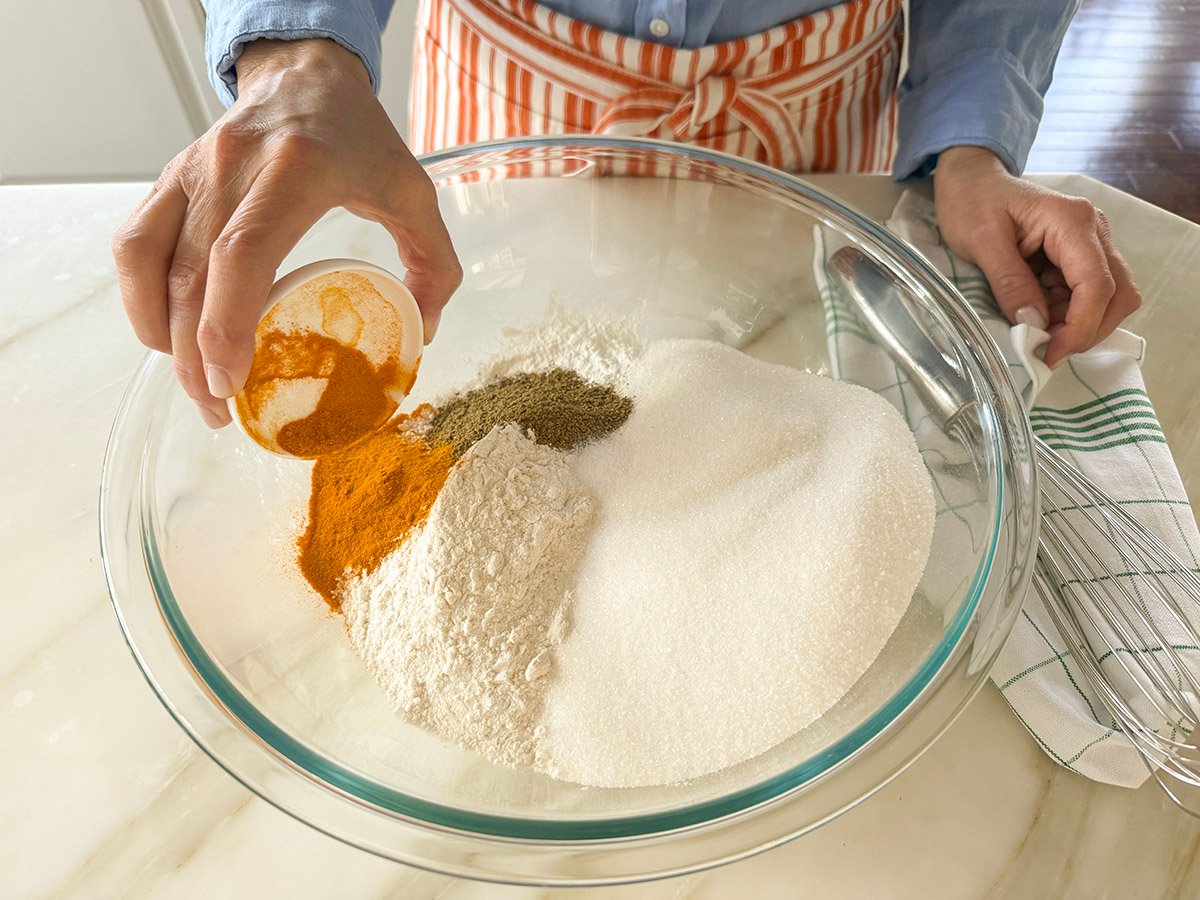
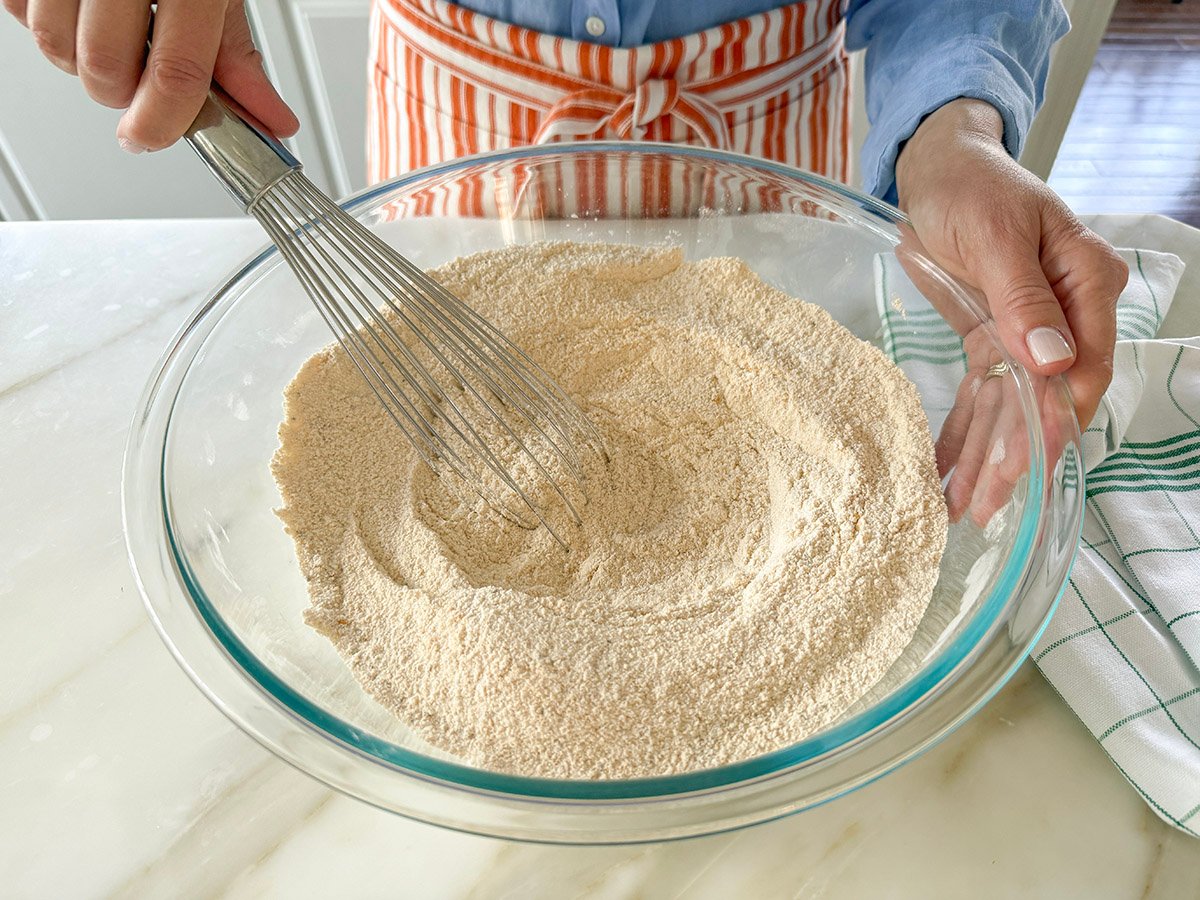
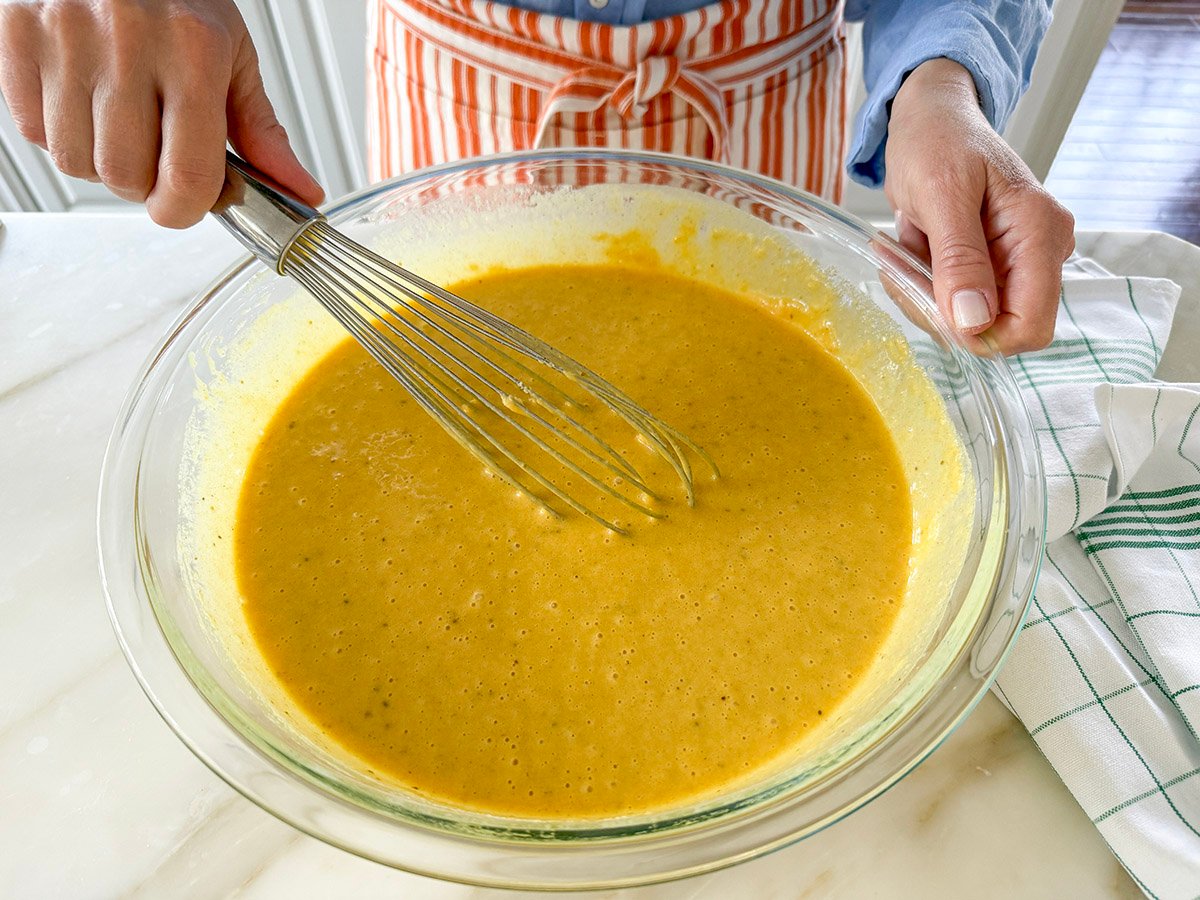
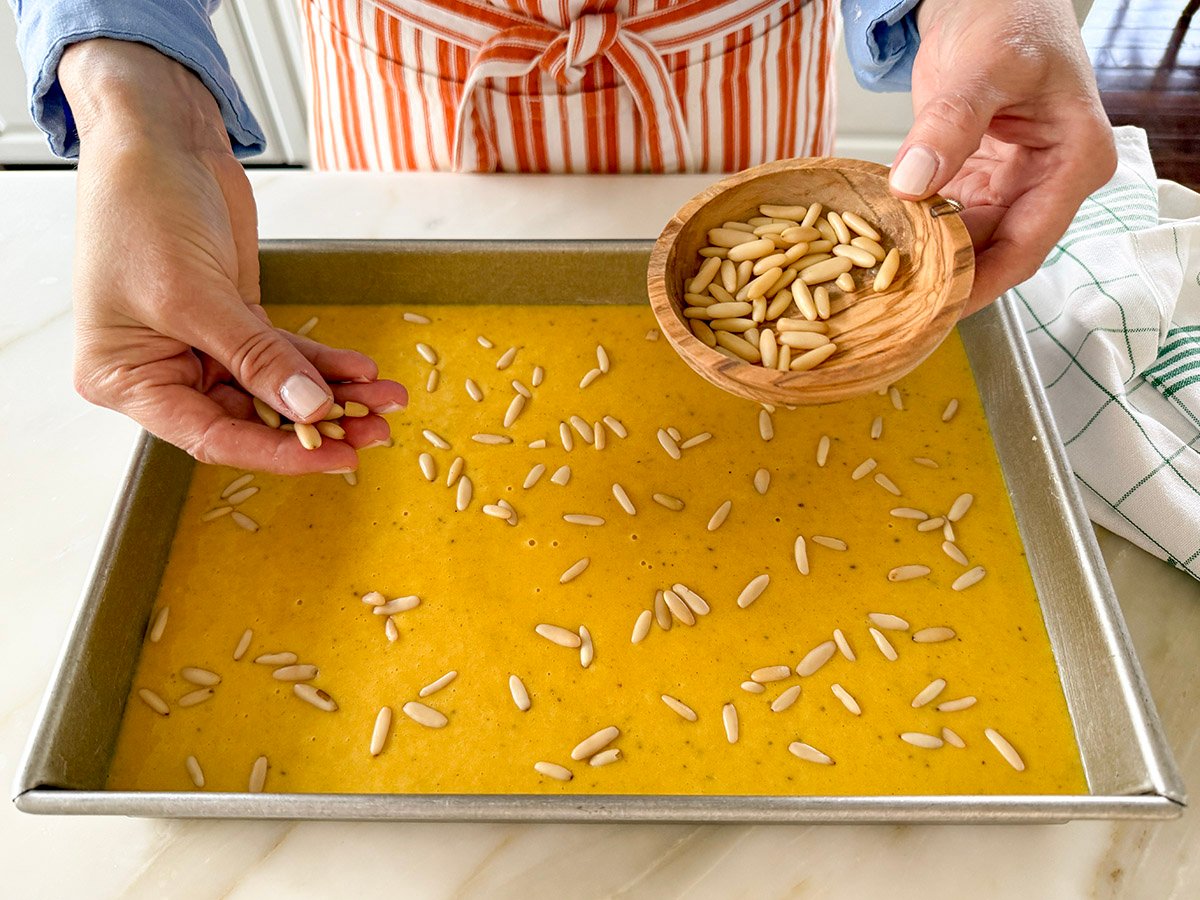
Making a great Lebanese sfouf cake is one of the easiest desserts in the Lebanese repertoire. All you need are a bowl and a whisk!
- Mixing Dry and Wet Ingredients: Start by whisking all of the dry ingredients in a large bowl. This flour mixture includes the semolina and all-purpose flours, sugar, baking powder, turmeric powder, and spices. In a medium bowl, whisk together your wet ingredients until fully combined. Ensuring sugar dissolves in the wet mixture is key to a smooth batter.
- Achieving the Right Texture: The cake will have a lush batter that has a medium body–it’s not super thick, and it’s not runny. This gives the cake a moistness, and a chewy texture that is characteristic of sfouf.
- Preparing the pan: The tahini covers the bottom of the pan only, leaving the sides dry. If you use too much tahini here, or coat up the sides, the sides of the cake lose their shape and don’t have a nice presentation.
- The pine nuts: I call for a full 1/4 cup of pine nuts for the cake because they are such an essential part of what makes sfouf what it is. Use them all and scatter them evenly over the top of the batter before baking. At the end of baking, the cake goes under the broiler for just a minute to further toast the top of the cake. Don’t multitask or walk away here! The top can burn too easily if you do. Stay right on it and watch for golden brown, then pull the cake out immediately.
- Cooling: Once baked, allow the cake to cool in the cake pan completely on a wire rack. This helps maintain the cake’s shape before diving in to slice and enjoy with a cup of tea or coffee.
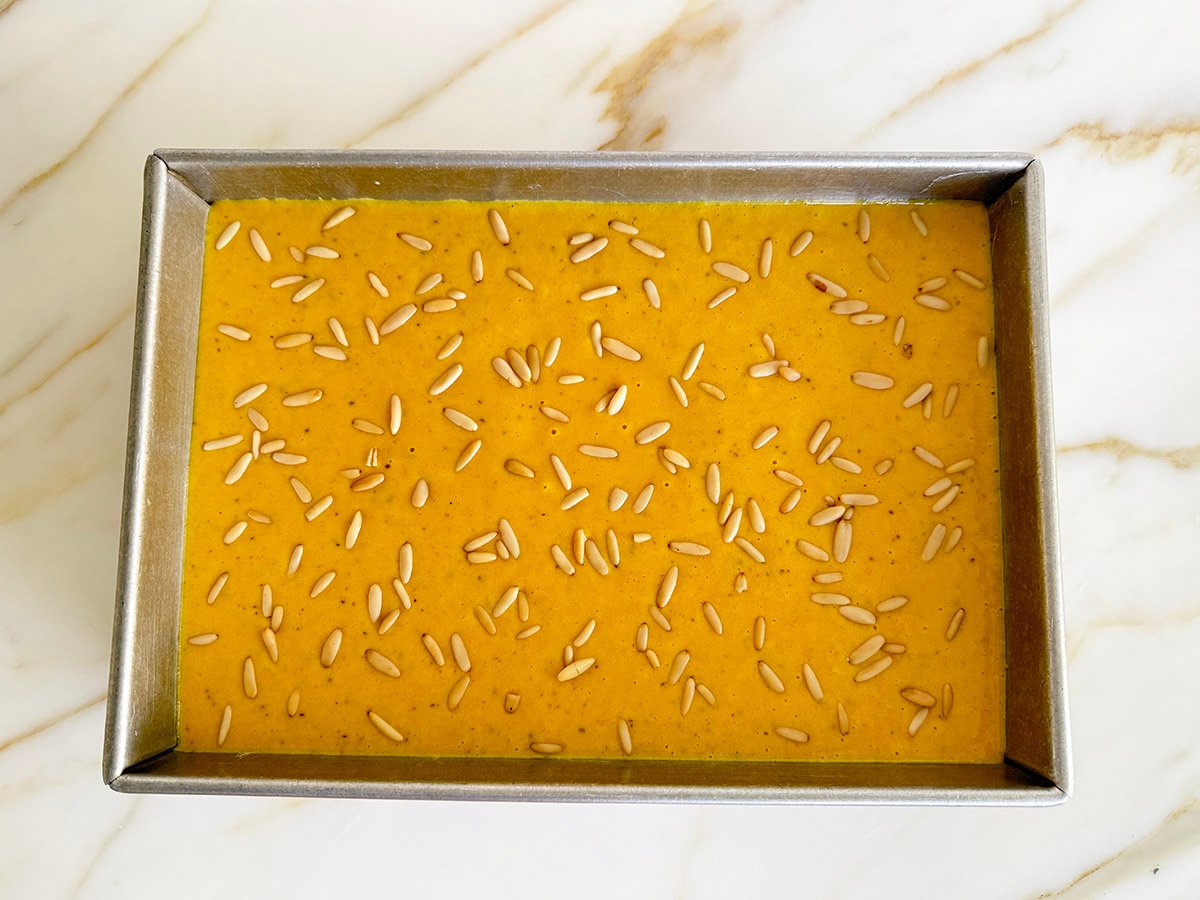
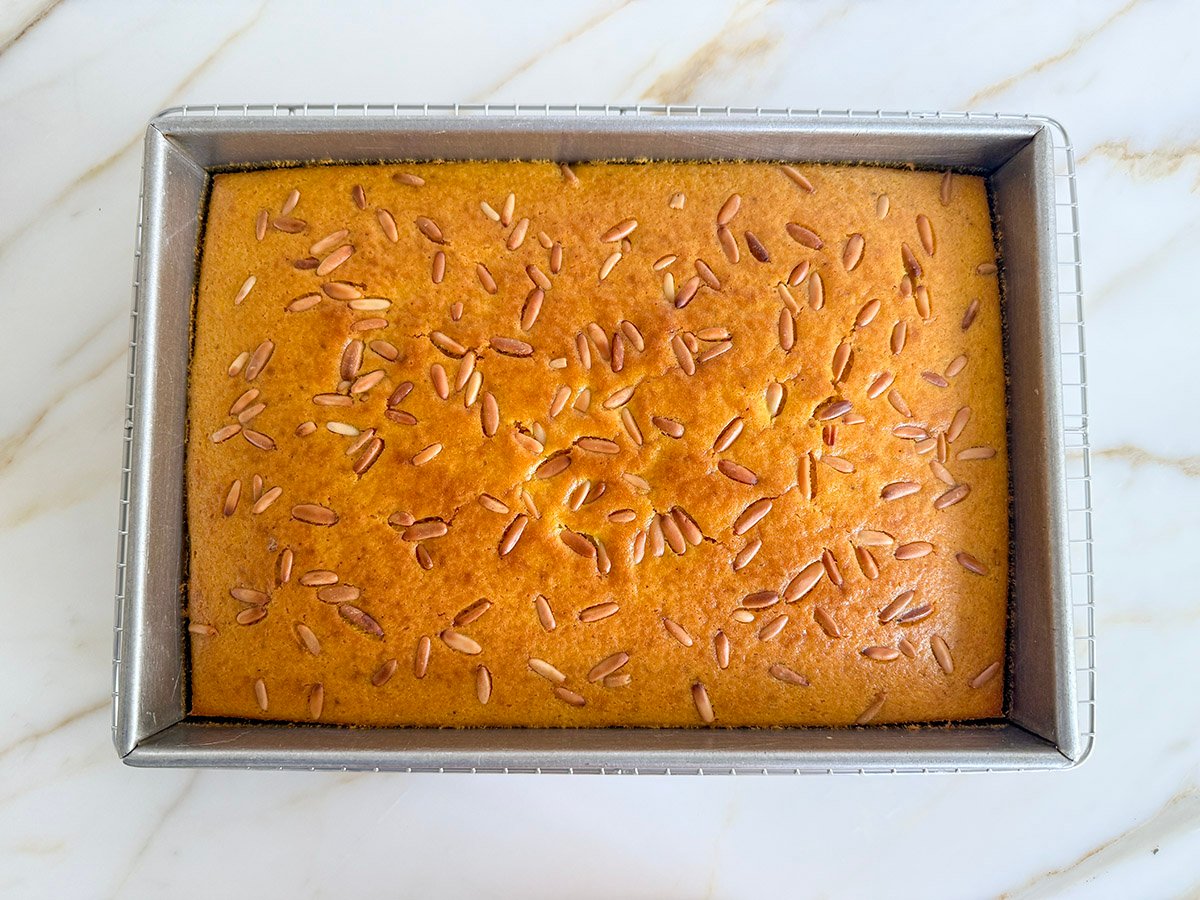
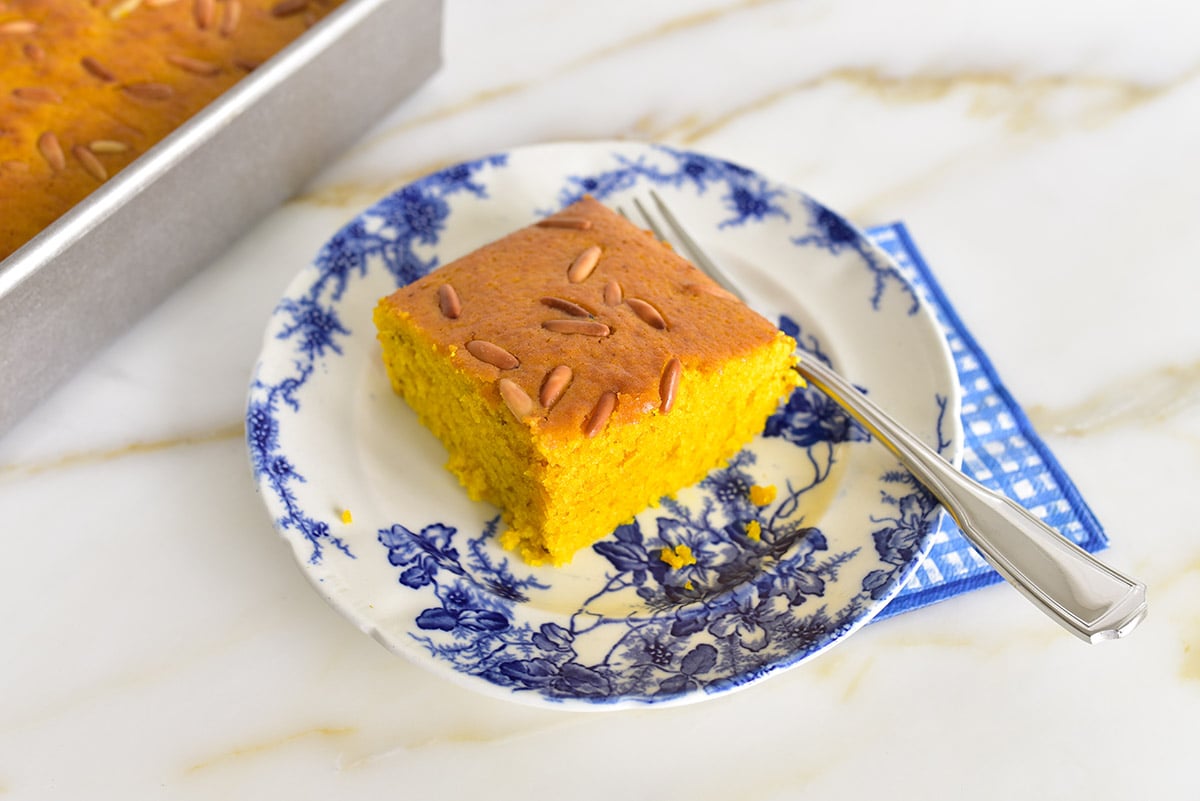
Storing the Cake
Proper storage is essential to maintain the sfouf’s texture and flavor. Cut the cake into pieces from the pan when you’re serving it, otherwise keep it in the pan or stored in an airtight container. You can also wrap any uneaten cake in plastic wrap. It will last at room temperature for several days.
For longer storage, you might consider refrigerating it, although the cake is best enjoyed fresh. If you prefer it chilled, just ensure to wrap it tightly; it can last up to a week in the fridge.
You can also freeze sfouf in an airtight container for a few months; thaw at room temperature before serving.
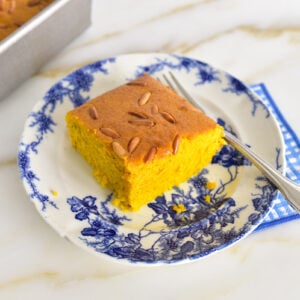
Sfouf Cake Recipe
Ingredients
- 1 tablespoon tahini
- 3 cups unbleached, all-purpose flour
- 1 cup semolina flour
- 2 1/2 cups granulated sugar
- 1 tablespoon baking powder
- 2 tablespoons turmeric powder
- 1 tablespoon ground anise seed
- 1/4 teaspoon fine sea salt
- 2 cups whole milk
- 1 cup neutral oil, such as vegetable, canola or safflower
- 1 cup water
- 1/4 cup pine nuts
Instructions
- Arrange an oven rack to the middle position and heat the oven to 350°F. Coat the bottom only of a 9x13x2-inch cake pan with the tahini.
- In a large mixing bowl, whisk the all-purpose flour, semolina flour, sugar, baking powder, turmeric, anise seed, and salt.
- Add the milk, oil, and water and whisk until the batter is smooth.
- Pour the batter into the prepared baking pan and smooth out the top. Scatter the pine nuts evenly over the top of the batter.
- Bake the cake for 34-36 minutes, or until golden brown and a pick inserted in the center comes out clean. Then, turn the broiler on a low setting and brown the top of the cake for about a minute or less, keeping a close eye on it so it doesn’t burn, until the top is deep golden.
- Cool the cake completely, then cut into slices and serve.
Video
Nutrition
Nutrition information is automatically calculated, so should only be used as an approximation.
In this Recipe:
More Lebanese Baking Recipes
Bake a glorious Lebanese Baklawa with my easy method (truly!).
One of the most iconic cookies in Lebanese baking are Lebanese Butter Cookies, or Graybeh. These are shortbread cookies that melt in your mouth.
Try my knafeh recipe for another iconic Lebanese pastry, with shredded phyllo, orange blossom syrup, and a melty cheese filling.
Enjoy excellent anise flavor and crunch in my Biscotti recipe.
For a warm spice cake that’s very tender and moist, bake a Cardamom Cake with almond topping.
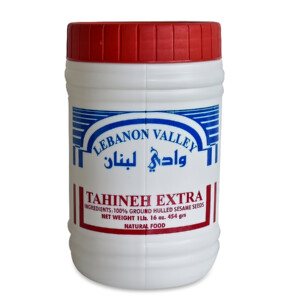
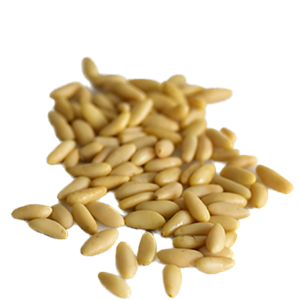

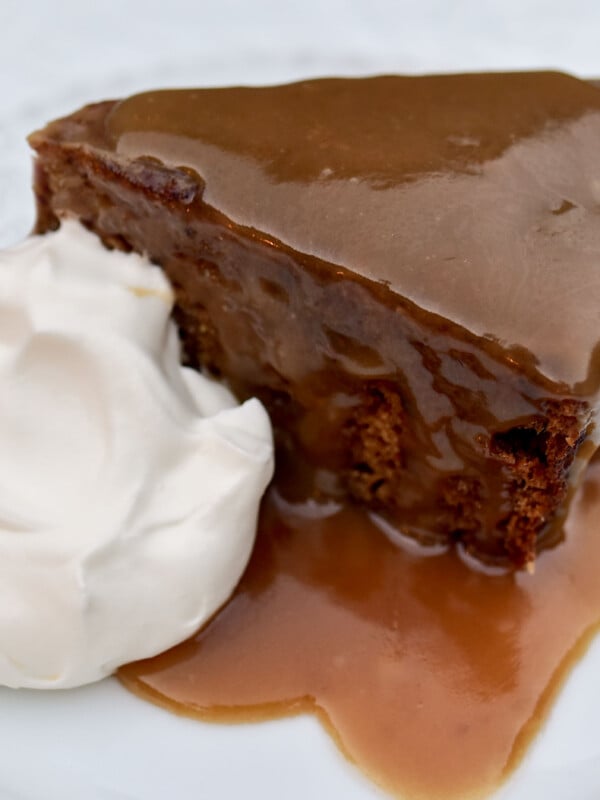
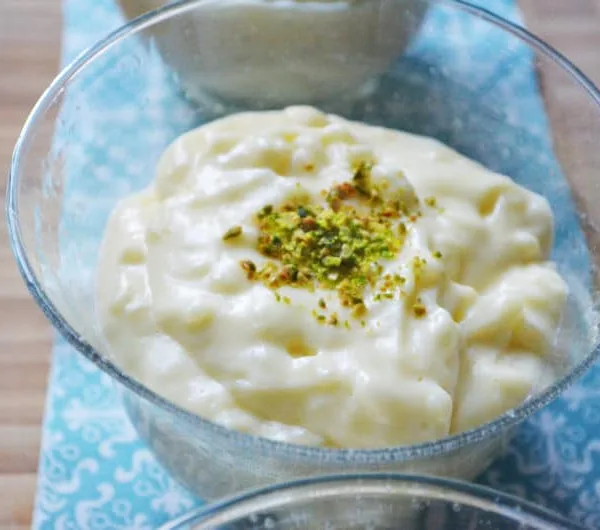
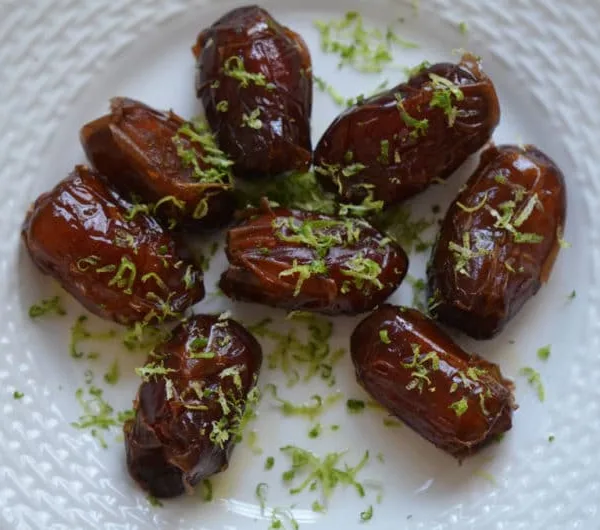







Thanks, Maureen! It’s by far the best SFOUF recipes I’ve ever tried. I didn’t have ground aniseed so I used the alternative spices & vanilla as you suggested. Simply scrumptious! I am totally going to try more of your recipes for more no-fail results! Also, I wanted to say how helpful your recipe’s advice and notes were.
Nadine that means the world, thank you very much!
Hello, would I be able to use ground star anise instead? Thank you
Sarah, great question–the flavor profile of star anise is similar to aniseed but ground, it can have a bitterness to it.
Thank you for the recipe! It made a delicious moist Sfouf
That means a lot Evelyn, thank you! We love it too.
What can I use instead of anise?
I can’t stand the taste of anise.
Thank you
Vita, you can use cinnamon, vanilla, a spice combo of nutmeg-cinnamon-allspice, that kind of thing. But you will use less of it than the anise. It’ll be delicious!
Hi Maureen-
Such fond memories of this Saturday morning breakfast cake! My boys love it as well! My question for you is….I would love to attempt to make this gluten free. One of my lovely daughters in law is gf. Should I try almond flour? I’m unsure of the role of semolina in the finished product….so a little worried about just subbing something.
Cara you are a wonderful mother! I do think this cake in particular would be more challenging to go gluten-free; texture will change very much. But it’s worth a try since it doesn’t have a whole lot of ingredients. I like your idea of almond meal and then perhaps try 1-1 Gluten Free flour in place of the all-purpose.
has anyone tried this recipe with a sweetener , like nevella or canderel?
for diabetics. My father is diabetic and cannot have sugar. I have tried similar recipe with a sweetener it becomes very dense and doesn’t rise
Good question Caroline, not something I have tested, but maybe others have.
My family recipe is similar to yours.
2 lbs 4oz plain flour
2 glasses sugar
1 3/4 glasses oil
1 tbsp butter
1 tbsp turmeric
1 tbsp dried yeast melted in 1/2 cup warm water with 1/2 tsp sugar
ground fennel and aniseed
1 glass water
Crumble oil and butter into the flour, mix in sugar and turmeric.
Dilute yeast in warm water and sugar until frothy, add to mixture.
Bind with water and add the spices.
Form into a dough and leave in a warm place to rest for 30 minutes.
Oil a large baking tray, cover with a layer of the mixture. Cut into diamond shapes and add a whole blanched almond (skin removed) in the middle of each diamond shape.
Bake in a moderate oven at gas mark 5 (190 C / 375 F) for about 30 minutes or until almost brown, but not too dry. Cool then store. It’s much better on the second day.
How great to get your recipe, John, thank you!
How great to get your recipe John, thank you!
Hi! The recipe still says ‘yogurt,’ so I’m a bit confused if it requires yogurt or milk? I made the recipe with yogurt as you indicated, but the batter was way too thick, so I had to add milk in the end.
In Lebanon, do they use real turmeric or yellow food coloring? I tried following your recipe to the exact T, but the turmeric is overpowering (perhaps it’s the ones sold here in the U.S.??) and it tastes nothing like the lovely sfouf of Lebanon.
Please help! And thank you for your blog 🙂
Hi Sarah! Thank you for your questions. In my experience, sfouf recipes are quite varied. Mine is more of a dense cake with a thick batter, and others are lighter, falling-apart moist and soft. You can use the yogurt for tenderness or milk instead. I know that often the Lebanese will use an orange food coloring for knafeh, but I have not seen it used in sfouf. You can of course cut back on the turmeric to whatever degree you like without upsetting the “chemistry” of the cake!
I always wanted to make this, but never did and probably never will. Why? Because I have no idea where to get the semolina flour.
Jeff, you can find semolina flour online and in many grocery stores–look for Bob’s Red Mill brand.
Hi! I tried making this and the result was not quite what I expected. I baked it for 50 min before I gave up and removed it from the oven. The center pieces were doughy and uncooked and the ones on the edges were crunchy and dry. I followed the recipe to the letter so I’m not quite sure what happened there..
Well I’m so sorry to hear that! Ovens can vary and calibration of temperature can get off kilter, so that may well be the issue since the cake baked so unevenly.
Thank you for the recipe! I made this for my Lebanese husband and he was not a fan of the anise and felt the cake was too dense. That did not, however, keep him from enjoying several pieces! He said it “tastes like home.” I’ll keep working on the recipe to better match whatever sfouf my husband enjoyed at home, but I would like recommendations on how to make it fluffier. Usually it has to do with the eggs… any suggestions?
Thank you–there are certainly many variations on sfouf! You can absolutely try adding eggs to make a fluffy cake; egg whites might be the ticket, beaten and then folded into the batter after the flour is added. This may require other adjustments to ingredients; experiment and see what works!
Thanks a lot for this recipe ! I will give it a try tomorrow first thing in the morning ! I love to bake before the sun is up , after the sun is down and anywhere in between…
Sfouf is excellent with milk and black coffee 🙂 thank you maureen
Wonderful Lara! A beautiful time to bake, agreed.
Can this be frozen?
The cake should freeze fine if very well wrapped–I have not tried it to say for sure though!
My Iraqi husband says sfouf ( pronounce suh-foof) means lined up rows of something like school children—or pine nuts. Suhf is singular and is used to ask what year are you in school. Arabic is such a beautiful, colorful language with a precise way of describing things. My husband often interprets songs of love and the words describing the object loved are many.
I love all of that, thank you Helen!
Hi Maureen—I’m making this today. I assume you add the vanilla to the liquid ingredients? Can’t wait to try this.
Thank you Rose! Yes, mix vanilla with milk and sugar!
If I don’t want to use dairy what kind of milk substitution would work well in this recipe?
Hi! You can substitute the milk with water, or try to substitute with coconut milk, or almond milk.
Thanks much, Maureen!
Thanks Maureen!
This is off topic. We love your nougat with pistachios & dried cherries recipe. The first time I made it, the mixture tripled in size during beating—just as your recipe says. Ever since I never achieve the tripling in size part. I’ve made nougat many times because we love it with Turkish coffee & your recipe is so good. It freezes well also. Any ideas?? Thanks.
Hi Helen–I love that recipe too! I wonder about the temperature of your honey syrup mixture; if that’s too hot it could prevent the egg whites from whipping properly. I too have experienced the odd occasion when the whites didn’t triple and I attributed it to a faulty thermometer. Now you’ve got me wanting some homemade nougat!!
I don’t see ‘milk’ listed in the ingredients–Am I missing it? How much milk?
Great catch Susan, thank you–all fixed!